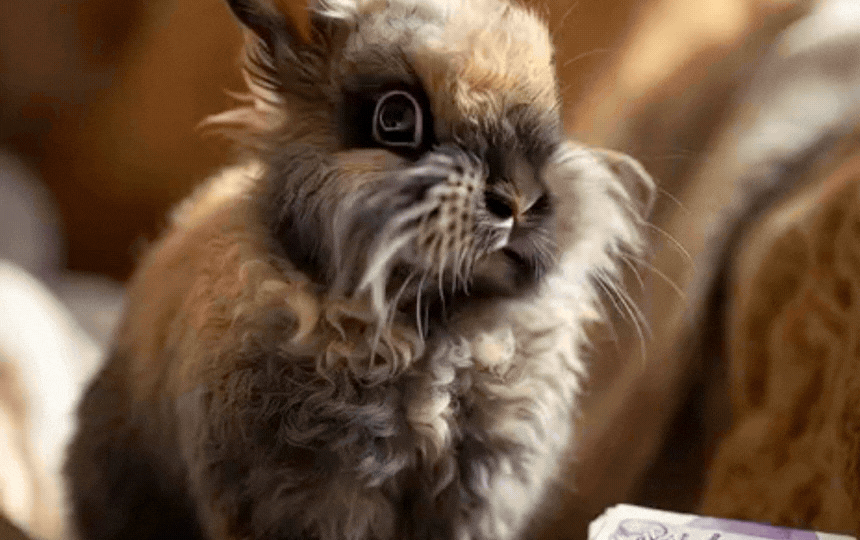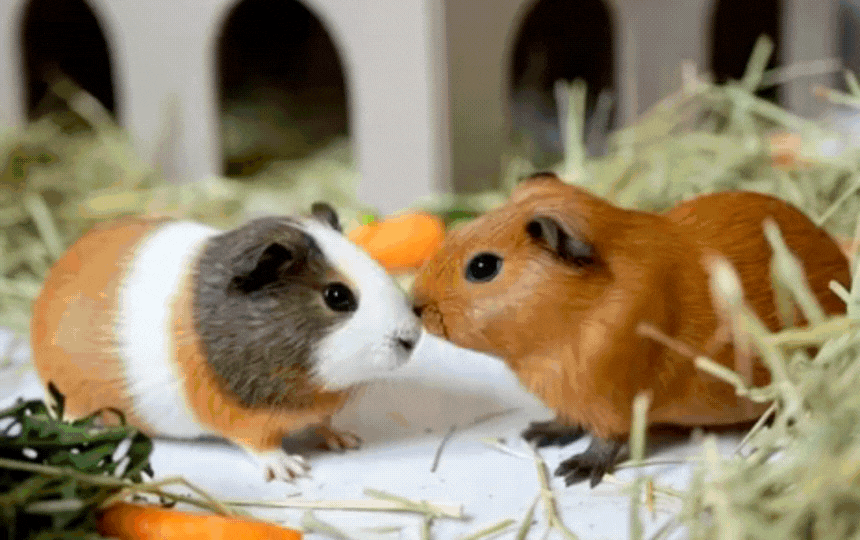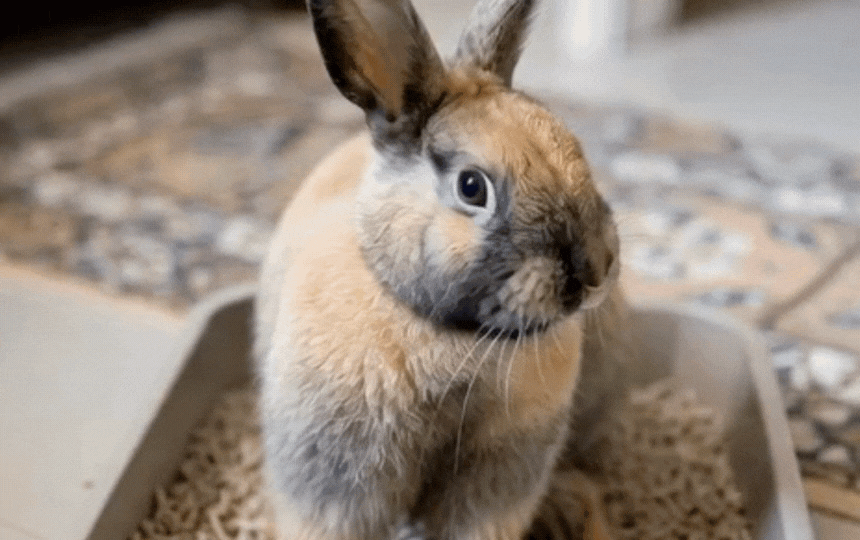Is Hamster Ownership Right for Me?
A GUIDE FOR PROSPECTIVE HAMSTER PARENTS
Are you considering bringing a furry friend into your home, but feeling uncertain about which pet would be the perfect fit for your lifestyle? Look no further than the adorable and charismatic hamster! These tiny, captivating creatures have captured the hearts of many animal lovers around the world. However, before you rush into adopting a hamster, it's crucial to evaluate whether hamster ownership is truly right for you.
We will delve into the various aspects of hamster ownership, shedding light on the responsibilities, joys, and challenges that come with it. Whether you're a first-time pet owner or experienced with other animals, this guide aims to help you make an informed decision about whether a hamster is the ideal companion for you.
We will explore a wide range of topics, from different hamster species available and their unique traits, to the care requirements, housing needs, and potential health concerns that come along with being a hamster parent. Additionally, we'll discuss the amount of time and attention hamsters require, as well as the financial considerations involved in providing them a comfortable and fulfilling life.
Hamsters are known for their delightful antics, playful personalities, and low-maintenance nature, making them an attractive choice for many individuals and families. However, it's crucial to remember that every pet comes with its own set of responsibilities and challenges. It's important to consider factors such as your daily routine, living environment, personal preferences, and any existing commitments before committing to bringing a hamster into your life.

So, if you're ready to embark on a journey filled with furry cuteness and joyful moments, let's dive into the world of hamster ownership and determine whether it's the perfect choice for you! Here are some points to consider:
- Commitment: Hamsters typically have a lifespan of 2 to 3 years, so you should be ready for a short-term commitment compared to other pets. Are you prepared to care for a pet during that time?
- Time and Interaction: Hamsters require daily interaction and mental stimulation. They are solitary animals, but they still need socialization, playtime, and exercise outside of their cages. Do you have enough time to dedicate to your hamster's needs?
- Space: Hamsters need adequate space to move around and explore. You'll need to provide a spacious cage with tunnels, hiding spots, and an exercise wheel. Consider whether you have enough space available to accommodate a hamster habitat.
- Nocturnal Nature: Hamsters are nocturnal creatures, meaning they are most active during the night. If you prefer a pet that aligns with your daytime schedule, a hamster may not be the best choice.
- Allergies: Ensure that you and other household members are not allergic to hamsters or their bedding materials before bringing one into your home.
- Responsibility: Owning a hamster requires taking responsibility for its care, including providing proper nutrition, cleaning the cage regularly, and monitoring its health. Are you ready for these responsibilities?
- Compatibility: Consider any existing pets you have. Some animals may not tolerate or interact well with a hamster, so it's essential to assess compatibility.
Remember, hamsters can make great pets, but they may not be the ideal choice for everyone. Take these factors into account, do additional research on hamster care, and consider your lifestyle and preferences before making a decision.
are there different types of hamsters?
Yes there are several different types of hamsters, each belonging to different species. Some of the most common types of hamsters kept as pets include:
- Syrian Hamster (Mesocricetus auratus): Also known as the Golden Hamster, the Syrian hamster is the most popular pet hamster. They are larger in size compared to other hamster species and come in various coat colours and patterns.
- Dwarf Campbell's Russian Hamster (Phodopus campbelli): Campbell's Russian hamsters are small and social. They have a gray-brown color with a dark stripe down their back.
- Dwarf Winter White Russian Hamster (Phodopus sungorus): Winter White Russian hamsters, also called Djungarian hamsters, change their coat colour from grey-brown in the summer to white during the winter months.
- Roborovski Dwarf Hamster (Phodopus roborovskii): Roborovski hamsters are the smallest of the pet hamster species. They are very active and known for their quick speed and agility. They have a sandy brown color and a distinct white eyebrow line.
- Chinese Hamster (Cricetulus griseus): Chinese hamsters are slightly larger than dwarf hamsters and have a longer tail. They have a grey-brown colour and a stripe running down their back.
These are just a few examples of the different types of hamsters commonly kept as pets. Each type has its own unique characteristics, care requirements, and personalities. It's important to research and understand the specific needs of the type of hamster you are interested in before bringing one home as a pet. Here are some books you might like to to use for your research:

SYRIAN HAMSTERS AS PETS
By Author: Roger Rodendale
The Syrian Hamster is known for its size and is one of the largest among the species preferred as pets.
These hamsters are extremely docile and are the easiest to domesticate and train.
They look like little stuffed toys and are hence known by the name, “Teddy Bear Hamster”
RUSSIAN DWARF HAMSTERS
By Author: Macy Peterson
Russian dwarf hamsters It is known that the dwarf hamster is a wonderful pet; especially for adults.
In the 1970s, the dwarf hamster was introduced in many parts of Europe.
They have gained a lot of popularity amongst pet lovers across the world since the time of their introduction.
The Campbell’s dwarf hamster and Whiter winter hamster are grouped under Russian hamsters.
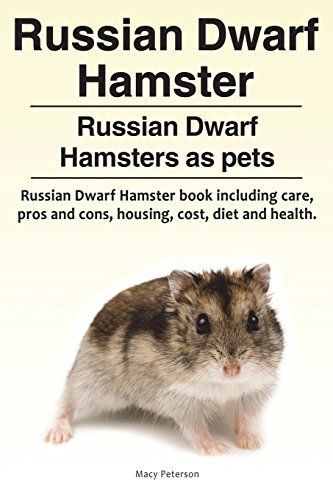
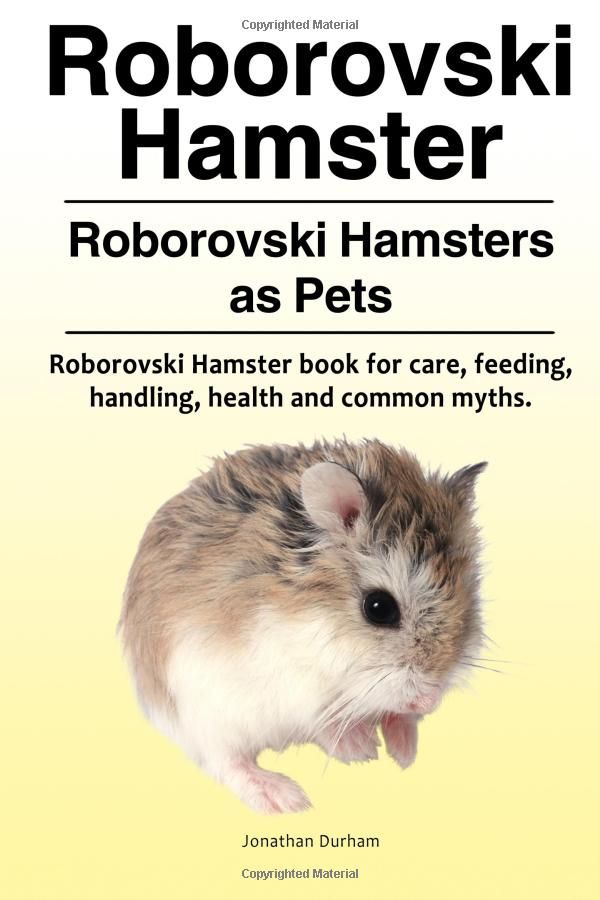
ROBOROVSKI HAMSTERS AS PETS
By Author: Jonathan Durham
The Roborovski Hamster as a pet is relatively new having only been domesticated in the 1970s and gained popularity around the 1990s.
Compared to other hamster species, especially dwarf hamsters, it has a relatively long life span and can live in captivity for up to four years. This is an all in one, go to guide, which covers all the main topics and answers any questions you may have
What breed of hamster is the friendliest?
While individual hamsters' personalities can vary, Syrian hamsters (also known as Golden hamsters) are often considered one of the friendliest and most suitable for handling. They are generally more tolerant of human interaction and can bond with their owners over time. Syrians are known to be curious, affectionate, and enjoy being held and played with. However, it's important to remember that each hamster has its own unique temperament, and proper socialization and handling from a young age can contribute to a hamster's friendliness regardless of its breed. It's essential to provide love, patience, and consistent positive interaction to foster a strong bond with any pet hamster.

How do I choose the right hamster for me?
When choosing the right hamster for you, there are several factors to consider. Here are some steps to help you make an informed decision:
- Research: Learn about different hamster species and their specific characteristics, care requirements, and temperaments. This will help you understand what type of hamster might be the best fit for your lifestyle and preferences.
- Consider your preferences: Determine what traits you are looking for in a hamster. Do you prefer a larger or smaller hamster? Are you drawn to a specific coat colour or pattern? Do you want a hamster that is more active or docile? Clarifying your preferences will narrow down your choices.
- Observe behaviour: When you visit a pet store or a breeder, spend some time observing the hamsters. Look for a hamster that appears healthy, alert, and active. Take note of their behaviour and temperament. Avoid hamsters that show signs of aggression or extreme fear.
- Handling and interaction: If possible, ask if you can handle the hamsters you are considering. Gently scoop them up and see how they respond to being held. A hamster that feels comfortable in your hands and shows curiosity or a willingness to explore may be a good choice.
- Trustworthy source: Purchase your hamster from a reputable breeder, a pet store with knowledgeable staff or even better rescue from a reputable . They can provide information about the hamster's background and assist you with any questions or concerns.
- Compatibility: Consider any existing pets you have and whether they would tolerate or interact well with a hamster. Some animals, such as cats or certain breeds of dogs, may have a natural prey drive that can put the hamster at risk.
Remember, choosing the right hamster is a personal decision. Take your time, do your research, and consider your lifestyle and preferences to ensure you find a hamster that will be a good match for you and your family.

should I get a male or female hamster?
Deciding whether to get a male or female hamster depends on your preferences and specific circumstances. Here are some considerations to help you make a choice:
- Behaviour and temperament: Male and female hamsters can have slightly different personalities. Male hamsters are generally more laid-back and relaxed, while female hamsters tend to be more active and adventurous. However, these traits can vary from hamster to hamster, so it's essential to spend time observing the individual hamsters you are considering.
- Scent marking and aggression: Male hamsters have a higher tendency to scent mark their territory compared to females. This behaviour involves rubbing their scent glands on objects and can result in a stronger smell in their living space. Additionally, male hamsters may be more prone to territorial aggression, especially when reaching sexual maturity. Neutering can help reduce aggressive behaviour in males.
- Compatibility: If you plan to keep multiple hamsters together, it's crucial to consider their compatibility. Hamsters are solitary animals and generally should be housed separately to avoid aggression and potential injuries. However, some dwarf hamster species, like Campbell's and Winter White Russians, can sometimes be housed in same-sex pairs or small groups if they are introduced at a young age and have enough space.
- Breeding concerns: If you don't intend to breed hamsters, it's generally recommended to choose one sex and ensure they are not housed with another hamster of the opposite sex to prevent unplanned litters. Hamster populations can grow rapidly, and finding homes for the babies may be challenging.
Remember, choosing the right hamster is a personal decision. Take your time, do your research, and consider your lifestyle and preferences to ensure you find a hamster that will be a good match for you and your family.
Pro’s and Con’s of hamster ownership
Owning a hamster can be a rewarding experience, but it's important to consider the pros and cons before making a decision. Here are some potential pros and cons of hamster ownership:

Pros of Hamster Ownership:
- Low Maintenance: Hamsters are relatively low-maintenance pets compared to larger animals. They require less space, are easy to clean up after, and don't need to be walked outside.
- Affordability: Hamsters are generally affordable to purchase, and their ongoing care costs are relatively low compared to other pets. Their food, bedding, and accessories are usually inexpensive.
- Suitable for Small Spaces: Hamsters are small animals, making them suitable for individuals living in apartments or small homes where space may be limited. They can comfortably live in a cage.
- Independent Nature: Hamsters are solitary creatures and can entertain themselves for hours with toys and activities within their habitat. They don't require constant attention or social interaction.
- Educational and Entertainment Value: Watching a hamster go about its daily activities can be fascinating and entertaining. Owning a hamster can also be an educational experience, particularly for children, as they learn about caring for a living creature.
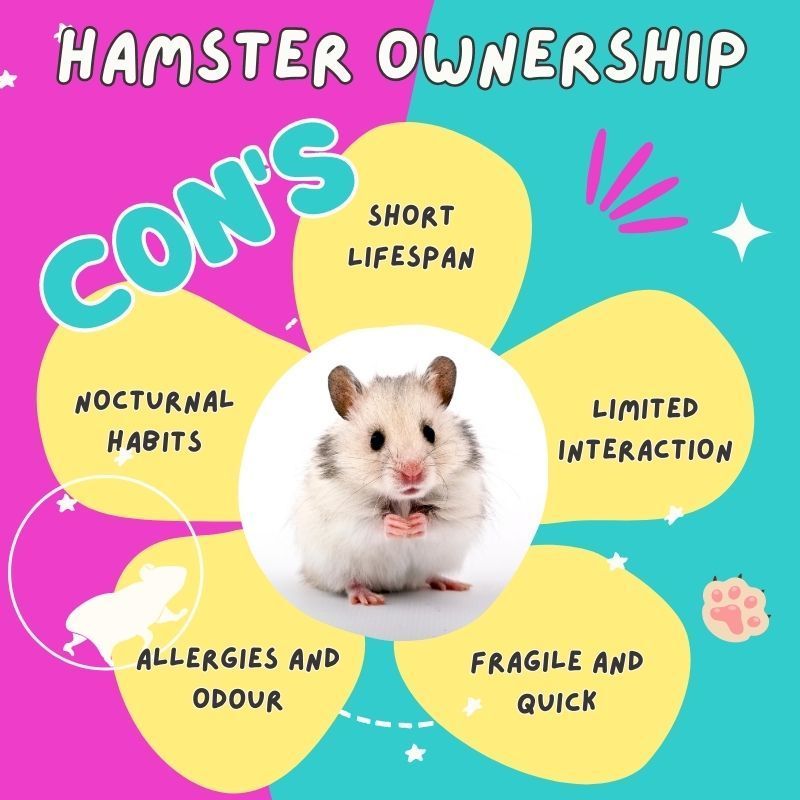
Cons of Hamster Ownership:
- Short Lifespan: Hamsters have a relatively short lifespan compared to some other pets. On average, they live for about 2 to 3 years, which means their time with you may be relatively brief.
- Nocturnal Habits: Hamsters are nocturnal animals, meaning they are most active during the night when you may be trying to sleep. Their wheel-running and other activities can generate noise that might disrupt your rest.
- Limited Interaction: While hamsters can become accustomed to human handling, they may not be as interactive or affectionate as some other pets, such as dogs or cats. They may not seek out attention or enjoy being held for long periods.
- Fragile and Quick: Hamsters are small and delicate creatures, making them susceptible to injury if mishandled. They can also be very quick, making it challenging to catch them if they escape their enclosure.
- Allergies and Odour: Some individuals may have allergies to hamsters or their bedding materials. Additionally, hamsters have a distinct smell, and their cages need regular cleaning to manage odour.
It's important to carefully consider these pros and cons, along with your personal circumstances, lifestyle, and preferences when deciding if hamster ownership is right for you. Remember to provide appropriate care, attention, and a suitable environment for your hamster's well-being.
in Conclusion
Deciding whether hamster ownership is right for you requires careful consideration and evaluation of your lifestyle, preferences, and ability to provide proper care. Throughout this blog, we've explored the various aspects of hamster ownership, from their unique traits and care requirements to the time and financial commitments involved.
Hamsters can make wonderful companions, bringing joy, entertainment, and a sense of responsibility into your life. Their small size, low-maintenance nature, and captivating personalities make them appealing to individuals and families alike. However, it's important to remember that hamsters are living creatures with specific needs and requirements, and they deserve the utmost care and attention.
Before welcoming a hamster into your home, ask yourself whether you can provide them with a suitable habitat, a proper diet, and regular social interaction. Consider your daily routine and the amount of time you can dedicate to their care. Additionally, ensure that your living environment is suitable for a hamster, taking into account noise levels, temperature, and potential hazards.
Furthermore, it's crucial to be aware of potential challenges that may arise, such as health issues, handling difficulties, and the necessity for regular cleaning and maintenance. Educate yourself on proper hamster care practices and be prepared to adapt and learn as you go, ensuring the well-being and happiness of your new furry friend.
Ultimately, hamster ownership can be a rewarding and fulfilling experience for those who are committed, responsible, and prepared to provide a loving and nurturing environment. However, if you find that your lifestyle or circumstances are not compatible with the demands of hamster ownership, there are numerous other pet options available that may better suit your needs.
Remember, the well-being of the animal should always be the top priority when considering pet ownership. If you determine that hamster ownership is not the right fit for you at this time, it's perfectly okay to explore alternative pet options or delay your decision until you're fully prepared.
We hope this blog has provided you with valuable insights and information to help you make an informed choice. Remember, whether you decide to become a hamster owner or opt for a different pet, the most important thing is to provide a loving, safe, and nurturing environment for your new companion.
Thank you for reading this post. We hope that you found it interesting and hope to you visit this page again soon. For more information, fun facts and cute photos, please follow us on social media. 🐹
THANK YOU
Thank you for reading this post. We hope that you found it helpful and hope to you visit this page again soon. For more information, fun facts and cute photos, please follow us on social media. ❤️
Disclosure & Disclaimer: Some of the links in this blog may be affiliate links, which means we earn a small commission if you click through and make a purchase. This comes at no additional cost to you but helps support the continued production of content. We only recommend products and services we believe will add value to our audience. The content provided is solely for informational purposes. Any advice provided is based on personal experience and research and may not be suitable for everyone. Before implementing any advice, please consult with a professional to ensure it's appropriate for your specific situation. Thank you for your support.

